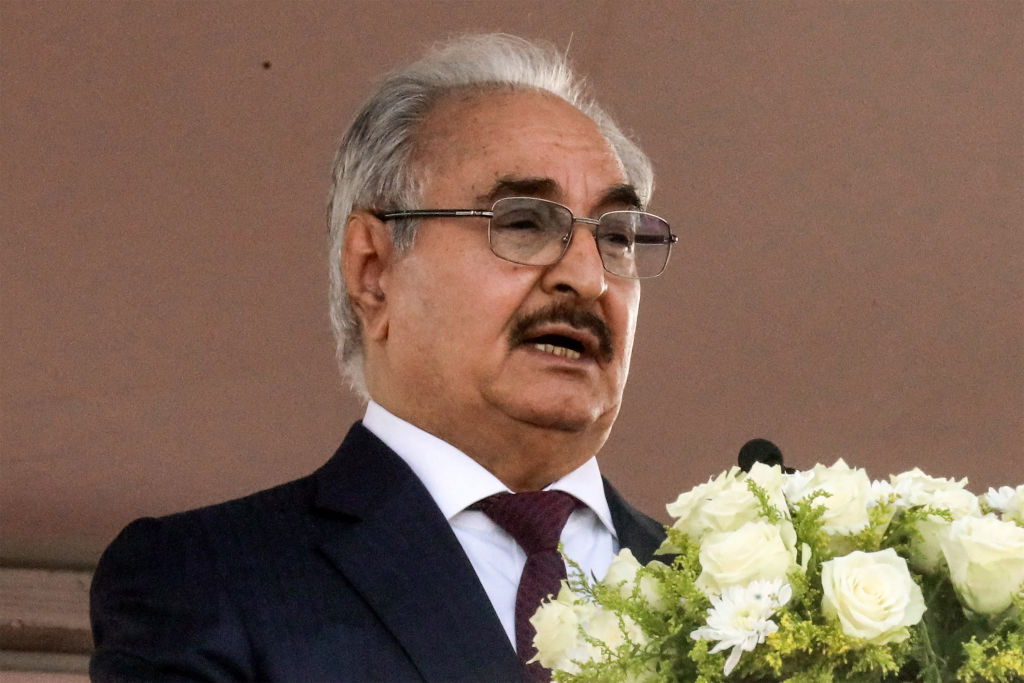ADF STAFF
Field Marshal Khalifa Haftar, the military leader in eastern Libya, is consolidating power within his family by appointing his sons to key positions in his so-called Libyan Arab Armed Forces (LAAF).
His youngest son, 33-year-old Saddam Haftar, has been elevated to the post of chief of staff of the land forces and is his father’s likeliest successor. Another son, Khaled, has been appointed to lead the security units of the LAAF.
A third son, Belgacem, oversees the Haftar-controlled Libyan Development and Reconstruction Fund created by the House of Representatives that governs the eastern half of the divided nation. The fund will accept foreign donations with promises to finance the reconstruction of cities, such as Derna, that were heavily damaged by a decade of civil war.
Observers have noted that the Haftar family is responsible for much of that damage as the leaders of the eastern military.
Libya remains divided between the internationally recognized government in Tripoli headed by Prime Minister Abdul Hamid Muhammad Abdul Rahman al-Dbeibeh as head of the Government of National Unity, and the eastern regime based in Tobruk of which the Haftar family has become the de facto leaders.
Officials made the appointments despite accusations that Haftar and his sons are responsible for financial and administrative corruption and plundering of public funds in eastern Libya.
According to the United Nations Panel of Experts on Libya’s 2023 report, the Haftar family took control over most social and economic life in eastern Libya after failing to conquer Tripoli in 2019. The elder Haftar visited Moscow in September 2023. Since then, the family has had increasingly close relations with Russia, which is seeking to build a naval base in Tobruk. In June, two Russian naval vessels visited Tobruk to build ties between the Libyan and Russian navies.
The elder Haftar is 80 and has experienced episodes of poor health in recent years. Experts say Saddam is unlikely to be as well received as a leader as his father, especially among the tribal communities that aided Haftar during the civil war.
“Khalifa has other sons who could pretend to succeed him, such as Khaled and Belqasim, but he knows that his aura, which enabled him to take the East and hold on to it, cannot be passed on to his progeny,” analyst Jalel Harchaoui told Africa Report.
Eastern tribal leaders worry that Haftar is building a dynasty, according to observers.
“How will the rival tribes and gangs react when he disappears, as well as Egypt, the powerful godfather to the east, who doesn’t like Saddam at all?” Harchaoui said.
Between 2016 and 2023, Saddam Haftar went from graduating from military college in Jordan as a captain to becoming a major general. At the same time, he commanded the Tarik Ben Ziyad Brigade, which has been denounced by Amnesty International for committing executions, torture and sexual violences in areas under its control “without any fear of consequences.”
Saddam Haftar has said he will run for the presidency of Libyan when and if elections are held this year. Elections have been delayed repeatedly since 2018.
In the meantime, the Haftar family continue to gather power over eastern Libya into its hands.
“The agenda to pass down the military leadership in eastern Libya has been underway for some time, with Haftar likely to continue in his position in the short term,” Libyan political analyst Ibrahim Belkacem told Middle East Monitor.
According to Libyan political analyst Imad Jalloul, the Haftars have brutally repressed opponents across eastern and southern Libya by arresting, kidnapping or killing political, tribal and civil society figures. Those activities may prove detrimental to them, according to Ben Fishman is a senior fellow in The Washington Institute for Near East Policy.
“The family is attempting to quell any doubts,” Fishman wrote recently. “But the authoritarian manner in which it operates may propel opponents within and beyond the Army.”

